
|
|
(chronological by film title) Introduction | 1920s-1930s | 1940s | 1950s | 1960s | 1970s | 1980s | 1990s | 2000s | 2010s |
(chronological by title) |
||
| Film Title/Year/Director/Length/Studio, Academy Awards, Brief Description | ||
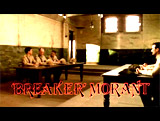
|
Breaker Morant (1980, Australia) This anti-war film's setting was during the era of the brutal Boer War (1899-1902) between the Boers (Afrikaaners) and the British Carabineers in the area of the Northern Transvaal - it was a struggle for independence. During the fighting, the elite Bushveldt Carabineers (Australians) were ambushed and Captain Hunt was captured, mutilated and killed. In revenge, Lt. Harry "Breaker" Morant (Edward Woodward) and his men took and executed prisoners. To end the war with the Boers and appease the Germans, British general Lord Kitchener selected three scapegoats to be put on trial: Morant, Lt. Peter Handcock (Bryan Brown) and Lt. George Witton (Lewis Fitzgerald). Lt. Colonel Denny (Charles Tingwell) presided over the 5-person general court-martial tribunal, held in a remote courtroom. Major Charles Bolton (Rod Mullinar) prosecuted, while inexperienced defense attorney Major F. Thomas (Edward Woodward) defended the three hapless soldiers in a sham trial. Thomas valiantly struggled to defend the men, arguing that in such an unconventional war, there were bound to be casualties, and unclear instructions about how to treat the enemy. Verdict: Handcock and Morant were sentenced to death (and shot at sunrise), while Witton was sentenced to life (although released after three years). |

|
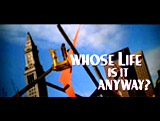
|
Whose Life Is It Anyway? (1981) This provocative film asked the question: Does a patient have the right to choose to die? 32 year-old gifted sculptor and art teacher Ken Harrison (Richard Dreyfuss) suffered horrible injuries following a car crash - a severed spinal cord. After six months, it was determined that he was paraplegic and paralyzed from the neck down. On a life-support machine in ICU with cameras monitoring him, he came to the conclusion that he wanted to die, if he could only get the hospital to discharge him. He told his dedicated girlfriend/dancer Pat (Janet Eilber) that he was terminating their relationship - and that he wanted her to regard him as dead ("I don't want to go on living like this"). Nonetheless, he kept an acerbic sense of humor, but mostly with one-liners about his 'vegetable' condition and his sexual impotence. The strict and stubborn Chief of Medicine Dr. Michael Emerson (John Cassavetes) was opposed to Harrison's wish to die, judged him to be too clinically depressed (and therefore incompetent) to make a logical decision, and injected him with Valium (against his wishes) to keep him comfortable and less anxious. Another physician Dr. Clare Scott (Christine Lahti) eventually came to be sympathetic and agree with Harrison that he had a right to decide his own fate. He was also supported by free-spirited, black orderly John (Thomas Carter) with a love of reggae music, and pretty young novice nurse Mary Jo Sadler (Kaki Hunter). The embittered Harrison hired personal injury lawyer Carter Hill (Bob Balaban) to represent him in a right-to-die case. He wanted a final ruling on whether he could legally be forced (or not) to stay in the hospital for treatment. The judge in the case, which was held in a hospital office, was Judge Wyler (Kenneth McMillan). Verdict: The hospital countered Harrison's wishes by threatening to order him involuntarily committed (under the Mental Hygiene Law) to remain in the hospital. Harrison's lawyer argued that he was being held without his consent, by bringing a pre-emptive action against the hospital with a writ of habeas corpus. The hospital's psychiatrist Dr. Jacobs (George Wyner) agreed with Dr. Emerson's adversarial position. Harrison defended his right to die in an eloquent speech, by claiming that he was completely helpless and imprisoned inside an already dead body. The Judge finally decided that Harrison could remain at the hospital, but remove his life-support and dialysis, meaning that he would die within a few weeks. |
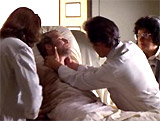
|

|
The Verdict (1982) Alcoholic, ambulance-chasing, personal injury lawyer Frank Galvin (Paul Newman) in Boston, disgraced (when framed for jury tampering) and with a reputation for losing, was forced to acquire business by attending funeral services and handing out business cards to bereaved family membres. Then, his friend and semi-retired mentor Mickey Morrissey (Jack Warden) referred him to a devastating hospital case - that would soon produce a medical malpractice lawsuit. A pregnant woman became comatose and was left in a vegetative state following delivery at a Boston Archdiocese hospital. In the most promising case of his career and to atone for his drunken past, Galvin (while struggling to stay sober) was challenged to prove that Dr. Towler (Wesley Addy) had administered the wrong anesthesia. It was assumed that the family (and defense) would accept a huge settlement of $210,000 from the hospital's head Bishop Brophy (Edward Binns), or from slick defense attorney Ed Concannon (James Mason). But Galvin, in a stunning reversal, refused to settle out of court and set about to take the case for the plaintiffs, in the presence of presiding Judge Hoyle (Milo O'Shea). Verdict: During the trial, Galvin was immediately confronted by sneaky tactics from Concannon's law firm: unscrupulous methods that removed a key medical witness, the undermining of a substitute witness' testimony, the planting of fellow bar-patron Laura Fischer (Charlotte Rampling) from the competing law firm as his love-making partner - in order to betray him, and cronyism with Judge Hoyle. Dr. Towler testified that he had done nothing improper or negligent, and had administered the proper drug for a patient that reportedly hadn't eaten for nine hours. Then, Galvin called a surprise witness, nurse Kaitlin Costello (Lindsay Crouse), to testify that Towler had ordered her to change the admitting records about the time interval from "1 hour" to "9 hours" - after he had made a fatal error by using the wrong anesthesia. She revealed a photocopy of the original admitting room form, showing the number "1" to the stunned court. Concannon conspired with the Judge to declare the nurse's testimony as inadmissable. In the conclusion, Galvin presented a subdued but convincing closing summation-argument to the courtroom jury: "So much of the time, we're just lost. We say, 'Please, God, tell us what is right. Tell us what is true.' I mean there is no justice. The rich win. The poor are powerless. We become tired of hearing people lie. And after a time we become dead, a little dead. We think of ourselves as victims, and we become victims. We become, we become weak. We doubt ourselves. We doubt our beliefs. We doubt our institutions, and we doubt the law. But today, you are the law. You are the law, not some book, not the lawyers, not a marble statue, or the trappings of the court. See, those are just symbols of our desire to be just. They are, they are, in fact, a prayer, I mean a fervent and a frightened prayer. In my religion, they say, 'Act as if you had faith. Faith will be given to you.' If-if we are to have faith in justice, we need only to believe in ourselves and act with justice. See, I believe there is justice in our hearts." The jury returned their decision in favor of Galvin's clients (the plaintiffs), thereby disregarding the judge's instructions to ignore the nurse's testimony. The jury foreman was told that they could legally award a greater amount than originally asked for. |
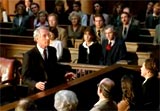
|
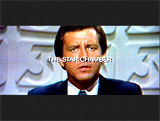
|
The Star Chamber (1983) In this mystery cop thriller-drama, small technicalities in the law (such as illegal search and seizures, forbidden by the 4th Amendment) were hindering the pursuit of justice. Conscientious LA Superior Court Judge Steven Hardin (Michael Douglas) was becoming increasingly frustrated when he had to disregard crucial evidence in cases where confirmed criminals were breaking the law, but were defended by clever defense lawyers who knew all the loopholes. There were two shocking cases of the miscarriage of justice: (1) killer Hector Andujar (Domingo Ambriz) murdered five old women (for their welfare checks), but then the case was dismissed regarding the illegal seizure of the murder weapon in his garbage, and (2) marijuana was suspected in the van (with unpaid parking tickets and warrants) of Lawrence Monk (Don Calfa) and Arthur Cooms (Joe Regalbuto), where the bloody shoe of young murder victim Danny Lewin was found; however, it was ruled that the police were unlawful in stopping the van with no probable cause, because the computer had erroneous information. Even though the two thugs had raped and killed Danny Lewin, they were set free due to the 'good-faith' errors of the police in gathering evidence. In anger and devastation, Danny's father Dr. Harold Lewin (James Sikking) attempted to take the law into his own hands and kill the two child murderers Monk and Cooms in the court, but injured a police officer instead. The distraught father committed suicide in jail. Mentor and fellow Judge Benjamin Caulfield (Hal Holbrook) inducted the disillusioned judge Hardin into the Star Chamber, an underground group of nine embittered judges who met in secret to retry cases as modern-day vigilantes (judge, jury, and executioner), with one basic premise: if found guilty, the accused were assassinated by hired killers. Verdict: Monk and Cooms were discovered to be not guilty by police Detective Harry Lowes (Yaphet Kotto), who discovered that Danny Lewin had been killed by members of a child pornography ring. [Lowes admitted that Monk and Cooms were despicable and had committed other crimes, but not Lewin's murder -- "Listen, I wanted those two guys. I thought they did it. I wanted to bust 'em. Then it turns out that some other lice crawls out from under their rocks and they prove to be the guilty ones. But those first two, I would've got 'em. It might've taken a little while, but I would've got 'em."] However, the Star Chamber had already ruled that the two men were to be targeted, and the hit could not be withdrawn. Desperate to stop the unwarranted murder of two innocent men (even though they were avowed criminals and drug dealers), Judge Hardin went rogue and attempted to track down the two and warn them. When he came upon them in an abandoned warehouse, they were in the midst of an illegal drug operation, and they didn't believe him. Although threatened with his life, Hardin was saved by the hitman (disguised as a police officer) who killed Monk and Cooms. Then, Hardin himself escaped death when Lowes arrived and killed the hitman. In the brief epilogue, Hardin and Lowes were attempting to bring down the Star Chamber by wire-tapping its illegal activities. |

|
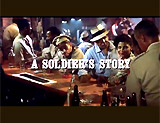
|
A Soldier's Story (1984) This well-crafted drama that examined racial hatred was set in 1944 (during World War II) at Fort Neal, a segregated Southern military post and base in Louisiana for black platoons. In the shocking opening, hated tyrannical black drill instructor Master Sergeant Vernon Waters (Adolph Caesar) was found shot to death (with a .45 caliber pistol) outside the base on a road in the town of Tynen, Louisiana. During the investigation (told through various interrogations and flashbacks) by tough, serious African-American attorney Captain Davenport (Howard E. Rollins) brought down from Washington, DC, it was at first thought that the drunken Waters was killed by white officers or the Ku Klux Klan, but they were quickly ruled out. Davenport faced many obstacles in his investigation: deceit, prejudice, lack of cooperation, a resistant chain of command, and black troops who were afraid to talk. Commanding officer Colonel Nivins (Trey Wilson) limited Davenport's official inquiry to only three days. Many of those questioned, including a number of fellow soldiers (black and white), had a motive to kill Waters. Davenport discovered that the unpopular Waters had denounced illiterate, guitar-strumming "Geechee" C. J. Memphis (Larry Riley) as a shameful example of the black race: "the Black race can't afford you no more. Oh, there used to be a time, we'd see someone like you singin', clownin', yassuh-bossin', and we wouldn't do anything. Folks liked that. You were good. Homey kind of nigger. When they needed somebody to mistreat, call a name or two, they paraded you. Reminded them of the good ol' days. Not no more. The day of the Geechee is gone, boy. And you're goin' with it. We can't let nobody go on believin' we're all fools like you. I waited a long time for you, boy." Waters had brought trumped-up charges against C.J., who was later driven to suicide (by hanging) in his cell while awaiting trial. Davenport also learned that only MPs and soldiers on special duty were given .45 ammunition. Verdict: It was revealed that Waters was killed by unrepentant and militant Pvt. First Class Peterson (Denzel Washington) who explained that he killed Waters in revenge for driving C.J. Memphis to suicide. Peterson confessed: "I didn't kill much. Some things need gettin' rid of. Man like Waters never did nobody no good anyway, Cap'n." Davenport responded: "Who gave you the right to judge? To decide who is fit to be a Negro and who is not? Who?" |
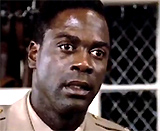
|

| Jagged Edge (1985) This early Joe Eszterhas-penned courtroom thriller and mystery 'who-dun-it' contained a number of unpredictable surprises and twists. In the film's opening, set during a thunderstorm in San Francisco at a remote beach house, wealthy socialite/heiress Mrs. Paige Forrester (Maria Mayenzet) was murdered by a hooded, unidentified attacker (with a ski mask and black leather clothing) who wielded a jagged-edged knife blade and slit her throat. The word "Bitch" was scrawled in blood on the bedroom wall. A maid was also killed (off-screen), and her husband Jack Forrester (Jeff Bridges) also suffered a head wound. However, Jack became a prime suspect and was arrested on charges of double homicide after prosecutor Thomas Krasny (Peter Coyote) learned that he was to inherit his wife's entire SF Times publishing empire fortune. Forrester was also suspected when a jagged hunting knife was seen in his country club gym locker (# 122) by janitor Fabrizi (Louis Giambalvo). Ex-prosecutor and civil rights litigator with a high success rate, Teddy Barnes (Glenn Close), a divorced mother with two children, agreed to defend Forrester when a lie detector test proved positive. Things became much more complicated when Teddy began a passionate affair with her handsome client. During the case preparations, Krasny suspected that Jack's head wound was self-inflicted. Barnes' office began to receive anonymous typewritten notes (from a 1942 Corona typewriter), including clues about the case, and statements that Forrester was innocent. The judge in the case was Judge Carrigan (John Dehner). Verdict: Prosecutor Krasny revealed that if Paige had divorced Jack, which was her intention (since they were both unfaithful to each other), Jack wouldn't have received the fortune. Pretty Virginia Howell (Leigh Taylor-Young) admitted that she had tried to have sex with Jack, but was jilted. Tennis pro Bobby Slade (Marshall Colt) testified that he had slept with Mrs. Forrester, and used the word "Bitch" to describe her. Another tennis club member admitted to having a jagged knife in his locker (# 222). Surprise defense witness Julie Jensen (Karen Austin), referred to one of the typed clue-notes, testified that 18 months earlier, she was attacked in the same manner as Paige Forrester - to prove that the defendant committed the similarly charged crime. However, Forrester was found not guilty. Soon after, Barnes found an incriminating typewriter (with a unique typeface including elevated 't's', that were found in all of the anonymous letters) in Forrester's closet, and confronted him with the information. In the nail-biting conclusion, a ski-masked figure entered her bedroom late at night with the murder weapon - a jagged-edged knife. She was ready for him - she shot him a number of times with a concealed gun. When he was unmasked by detective Sam Ransom (Robert Loggia), it was revealed that it was Jack who was the attacker (Ransom: "F--k him, he was trash"). |

|

| Nuts (1987) High-class prostitute Claudia Draper (Barbra Streisand) was on trial for first-degree manslaughter, although she had acted in self-defense against one of her abusive clients Allen Green (Leslie Nielsen) (seen in flashback). The main issue in this serious, issue-oriented dramatic thriller was whether the hostile, troubled, uncooperative and disruptive defendant was mentally competent to stand trial. She wanted to be tried, but her parents, mother Rose and stepfather Arthur Kirk (Maureen Stapleton and Karl Malden), to avoid scandal, wanted Claudia to be declared "nuts" and committed for psychiatric treatment (probably indefinitely). They had hired high-priced WASP lawyer Clarence Middleton (William Prince), but he quit after Claudia punched him in the face. Crusty Judge Stanley Murdoch (James Whitmore) then assigned white-haired and bearded public defender Aaron Levinsky (Richard Dreyfuss) to take the case - he was also treated to heavy doses of Claudia's belligerent abuse, tauntings, and suspicions. In the case, Bellevue Hospital pedantic psychiatrist Dr. Herbert Morrison (Eli Wallach) believed that Draper needed to be institutionalized for her anti-social tendencies. The prosecutor was Frances MacMillan (Robert Webber). Verdict: A competency hearing was held in a closed courtroom, before Judge Murdoch. Draper refused to be silent, interrupted the proceedings continually, and wouldn't obey the Judge. Both of Claudia's parents stated that their daughter needed to be treated rather than subjected to a trial. During cross-examination, Levinsky was able to procure a damning confession from Mr. Kirk - he was guilty of incest against Claudia, bathing her even up until she was 16 years of age. This revelation helped to explain how the bright, upper-class, white girl Claudia chose to become a hooker. Draper took the stand and testified on her own behalf, and admitted how she chose to make a responsible living as a high-priced call girl: "You think giving blow jobs for $500 is nuts, huh? Well, I know women who marry men they despise so they can drive a Mercedes and spend summers in the Hamptons. I know women who crawl through s--t for a fur coat. I know women who peddle their daughters to hang on to their husbands. So don’t judge my blow jobs, they’re sane. I know what I was doing every god damned minute and I’m responsible for it." She pleaded with the Judge to allow her to be tried, and judged for her own actions. She refused to be examined by another psychiatrist. Murdoch eventually caved in, and allowed her to be released from custody in order to stand trial for manslaughter. In a short epilogue, Draper was found not guilty through the efforts of crusading Levinsky. Psychiatrist Dr. Morrison resigned from his position. |

|

| Suspect (1987) In this mystery thriller, in the opening sequence, US Supreme Court Justice Lowell (Thomas Barbour) made a tape recording, gave a secretary a thick envelope, and then suicidally shot himself in the mouth. Shortly later, Justice Department file clerk Elizabeth Quinn (Katie O'Hare) was also found dead (with her throat cut) and floating in the Potomac River. Derelict, homeless, fierce-looking, bearded Vietnam-Vet Carl Wayne Anderson (Liam Neeson), a deaf mute, was arrested for the crime. He was in possession of a knife and her purse/wallet (with only $9), and had been found sleeping in Quinn's unlocked parked car the night of her murder, in order to keep warm. Burned-out, dedicated D.C. public defender Kathleen Riley (Cher) was assigned to defend Anderson, who could only communicate through writing. He claimed he saw Quinn only after she was dead. He claimed another man with tattoos named Michael (Paul D'Amato) might also be a suspect. The case was to be prosecuted by Charlie Stella (Joe Mantegna), while presiding over the case was Judge Matthew Bishop Helms (John Mahoney). Riley only needed to prove that there was 'reasonable doubt' that Anderson was guilty. Verdict: The prosecutor claimed that when Quinn returned to her car, Anderson robbed and then killed her. Riley denied that he had committed the murder. The defense was bolstered when one of the jurors, Washington DC milk producer lobbyist, slick Eddie Sanger (Dennis Quaid), conducting his own discreet (and unethical) investigation into the killing, was collecting evidence, providing anonymous clues, and helping defender Riley with legal research - without the Judge becoming suspicious of jury tampering. She was able to have the case's doctor admit that the killer was right-handed, due to the nature of the stab wound. She clearly demonstrated to the court that Anderson was left-handed. With Quinn's filing cabinet key, Riley and Sanger broke into her files, and learned she had been transcribing trial transcripts from federal cases in 1968. In Quinn's car, Riley also found an audiocassette left in her tape deck - it contained the last confessional words of Justice Lowell as he described a 1968 case in which he (and others) had conspired to accept bribes (an important judicial appointment) in order to dismiss the prosecution's charges against a gangster named Cook. [Note: The 1968 prosecutor was presumed to be Deputy Attorney General Paul Gray (Philip Bosco). It was possible that Gray murdered Quinn when she notified him of the impropriety. This was the film's red herring, however.] It was soon revealed in the 'it-came-from-left-field' ending that Judge Helms, not Gray, was the 1968 prosecutor in the fixed case. When Quinn approached Judge Lowell with her evidence, Lowell committed suicide. But when she confronted Judge Helms, he murdered her, to prevent her whistle-blowing from hurting his chances of a promotion. Helms' bleeding right wrist, caused when Riley sliced the wrist of an unknown assailant in a dark basement the day before, also gave him away. |

|
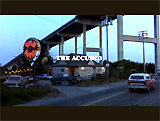
| The Accused (1988) This thoughtful, fact-based drama was based on a real-life incident of a 1983 rape in New Bedford, Massachusetts. It provided a provocative look at how the justice system treated victims who were often seen as worthy of blame. In mid-April 1987, Sarah Tobias (Jodie Foster in an Oscar-winning role), a sexily-dressed, drunk, working-class patron was in The Mill, a seedy roadside bar, following a fight with her live-in boyfriend Larry (Tom O'Brien) - he was a drug dealer and would-be musician. A bruised, still-intoxicated and half-dressed Sarah ran barefoot and screaming from the roadside bar where she'd just been raped by three men on a pinball machine. Prosecuting Deputy D.A. Kathryn Murphy (Kelly McGillis) took the case, and thought her only chances were a plea bargain with the brutal gang-rapists. She knew she couldn't get a conviction, because Sarah would be unfairly accused of enticing her attackers: "Raped? She f--ked a bar full of guys then she turns round and blames them for it?" The three rapists agreed to plea guilty to "reckless endangerment" instead of rape, with a lesser sentence of no more than 9 months in jail. They were Danny (Woody Brown), Bob Joiner (Steve Antin), and Kurt (Kim Kondrashoff). To satisfy Tobias who disagreed vehemently with her tactics and felt betrayed, Murphy further pursued the case by prosecuting three of the onlooking bystanders for "criminal solicitation" - for inciting or encouraging others to commit a crime. However, she was unsupported by DA Paul Rudolph (Carmen Argenziano). Verdict: College-frat student Kenneth Joyce (Bernie Coulson) was the key witness who saw the rape (and had watched the encouraging bystanders), but was initially reluctant to testify. He then agreed since his testimony was the crux of the case. He had called 911, but did not personally intervene during the incident. The entire rape episode was voyeuristically envisioned during the lengthy witness recounting (on Sarah's behalf), describing how the three barflies cheered on the rapists. Murphy presented a forceful court argument against the men who encouraged the rape of her client: "These three men did worse than nothing. They cheered, and they clapped, and they rooted the others on. They made sure that Sarah Tobias was raped, and raped, and raped. Now you tell me, is that nothing?" The three who were convicted: Cliff 'Scorpion' Albrect (Leo Rossi), Matthew Haines (Andrew Kavadas), and Stu Holloway (Tom McBeath). |

|
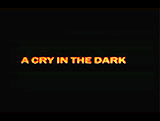
| A Cry in the Dark
(1988, Australia/US) (aka Evil Angels) The central characters in this docu-drama (a true life story), living in Queensland, Australia, were 7th-Day Adventist Church minister Michael Chamberlain (Sam Neill), his devout and religious wife Lindy (Meryl Streep), and their three children, including 10-week old infant Azaria. In late summer of 1980, the family took a vacation camping trip to the aboriginal sacred spot Ayers Rock in the central Australian outback. During an outdoor nighttime barbecue with other campers, Linda claimed that she saw a dingo (wild dog) carrying off her sleeping baby from their open camping tent. She was frantic: "The dingo took my baby!" After a search, Azaria was never found. After an initial inquest, it was ruled that Lindy's dingo account was true. However, the explosive case caused a media frenzy and unfair witch-hunt, and some theorized that Lindy, who appeared cold-hearted, stoic and emotionless (at the request of her lawyer), had carried on a ritualistic sacrifice of her child by decapitating the baby with a pair of scissors. Michael was found with a small wooden coffin used as a "offering plate" for his parishioners' packs of un-smoked cigarettes, fueling speculation about a sacrifice. The press also published the inaccurate rumor that Azaria meant "sacrifice in the wilderness." When the police questioned Lindy more thoroughly, inconsistencies caused them to suspect her, and the case was reopened as a murder case. Her husband was charged with being an accessory. Ian Baker (Bruce Myles) was the case's prosecutor, while the couple (who testified in their own defense) were represented by Phillips (Neil Fitzpatrick). Verdict: During the testimony in a second hearing, forensic experts (from London) and other academic experts provided lots of circumstantial evidence, but nothing conclusive. The infant's jumpsuit (with ripped gashes not caused by a dingo) was found in a cave about three miles from the campsite. There was conflicting and confusing evidence presented about the jumpsuit, and about the predatory behavior of dingos. For example, there were traces on infant blood in a camera case and in the family's car, but the causes were unclear. Professor Cameron (Kevin Miles) testified that there were small bloody imprints on the jumpsuit, and that the lack of saliva on the clothing indicated that it wasn't a dingo attack. He was countered by another expert who claimed saliva was present. In an obvious miscarriage of justice (there was no body, no motive, no weapon, and no hard evidence), in October of 1982, Lindy was found guilty of murder and sentenced to a life sentence - with hard labor. Michael was found guilty as an accessory and given an 18-month suspended sentence. Then over three years later, Azaria's outer jacket was found. Lindy was released from prison, and the case was reopened. In 1988, all convictions against Lindy and Michael were overturned. |

|
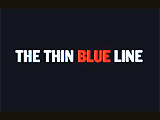
| The Thin Blue Line (1988) This engrossing documentary expose about a gross miscarriage of justice from writer/director film-maker Errol Morris had the intriguing tagline: "A softcore movie, Dr. Death, a chocolate milkshake, a nosey blonde and 'The Carol Burnett Show.' Solving this mystery is going to be murder." [Note: Morris' original intention was to make a documentary about notorious Dallas forensics psychiatrist James Grigson, who had earned the nickname 'Dr. Death' for the number of times his expert testimony had been instrumental in sending defendants to the electric chair.] The crime scene and investigation of a police officer's murder in Dallas, Texas in late November of 1976, was re-enacted in the film. The crime occurred during the Thanksgiving Day weekend in 1976, after 28 year-old drifter Randall Dale Adams (Himself and Adam Goldfine) ran out of gas on the highway. He hitched a ride with 16 year-old teenager David Ray Harris (Himself and Derek Horton) driving a stolen blue compact car (and also having stolen his father's .22 caliber revolver and shotgun). A few hours later (after drinking, smoking pot, and watching two soft-core porno films at a local drive-in), their car was routinely stopped (for not having proper lights) shortly after midnight by Dallas police officers Robert Wood (Ron Thornhill) and Teresa Turko (Marianne Leone). Wood was killed with five shots as he approached the car - it was unclear who had pulled the trigger. Turko (who had cast aside a chocolate milkshake) couldn't confirm conclusively the type of car or its driver. Police were alerted to Harris after he had returned to his small Texas hometown of Vidor, where he bragged about killing "the f--king pig." When police questioned him, he perjured himself and pinned the killing on Randall. About a month after the crime, Adams was arrested and questioned (without a lawyer present), all the while protesting his innocence. He was forced to sign a false confession that he was in the car with Harris, but didn't know what had happened. Assistant District Attorney Doug Mulder charged Adams with the murder, and pushed for the death penalty. Harris escaped with any charges because he was an underage juvenile and couldn't be sentenced to death. Adams was defended by defense attorneys Edith James (Herself) and Dennis White (Himself), while the judge presiding over the case was Donald J. Metcalfe (Himself) . Verdict: During the murder trial, Harris claimed it was Adams who (1) was driving, and (2) shot and killed the officer with the stolen gun under the seat. Harris said he was crouched down in the passenger seat. Other misleading eyewitnesses claimed that Adams was the killer, but Mulder was able to keep their testimony a secret so that they couldn't be cross-examined. Adams calmly contradicted Harris' account. He said he had been dropped off at his motel room at about 9:30 pm, a few hours before the crime, and that he had watched The Carol Burnett Show on TV before going to sleep. Nonetheless, Adams was convicted and sentenced to death in 1977, but his sentence was later commuted to life in prison. As a result of the film, convicted murderer Adams, who had been wrongly imprisoned for twelve years, was finally set free. |
 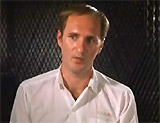
|

| Music Box (1989) This dramatic courtroom thriller was taglined: "As a lawyer all she wanted was the truth. As a daughter all she wanted was his innocence. How well do you really know your father?" Hungarian-American immigrant Michael J. Laszlo (Armin Mueller-Stahl), an anti-Communist, was threatened with having his US citizenship revoked, and being deported to Hungary to stand trial for war crimes. Laszlo insisted that it was a case of mistaken identity. His daughter Ann Talbot (Jessica Lange), a tough Chicago defense attorney, unwisely decided to defend her father in the case. One of her motivations was her son Mikey's (Luke Haas) deep love for his grandfather. Talbot's prepared defense was that the communist Budapest government (and its AVO secret police) had fabricated the allegations due to Laszlo's fanatical anti-Communist feelings. The US federal government's position, argued by prosecutor Jack Burke (Frederic Forrest), was that Laszlo had falsified his original citizenship application by failing to disclose his name "Mishka" - and his leadership and association with the terrorist organization, political party and death squad known as Arrow Cross that had brutally persecuted and murdered scores of Hungarian Jews. The presiding judge was Judge Irwin Silver (James Zagel), a Jew. Verdict: During the denaturalization trial in a Chicago federal court, evidence was presented showing a copy of young Laszlo's Arrow Cross ID card with his name "Laszlo Miklos." The picture matched his visa application. Talbot argued that any evidence was forged or inauthentic. However, there were surviving witnesses who testified to 'Mishka's' atrocities. During cross-examination, Ann was able to cast some doubt on some of the prosecution's charges. During the trial, the judge and opposing lawyers traveled to Budapest, where Ann planned to speak to a witness who couldn't travel, and was handed some documents by a member of the secret police. During the witness' testimony, Ann discredited him - she dismissed the accusations and documents by claiming that the witness had identified three completely different individuals as 'Mishka.' Judge Silver promptly dismissed the government's case. Before leaving Europe, Ann visited Melinda Zoldan (Elżbieta Czyżewska), the sister of Tibor Zoldan, one of Laszlo's fellow Hungarians (and a member of the Arrow Cross organization!) to whom he had written numerous checks. In Zoldan's wallet was a ticket to a pawn shop for a music box. When she redeemed the pawn ticket in Chicago, she found proof of her father's guilt. The pretty music box contained B/W photographs of her father involved in atrocities and war crimes. Ann denounced her deceitful father - threatening to never have Mikey or herself see him again. She sent the damning photographs to prosecutor Burke, who publicized them in the press. |

|

|
True Believer (1989) Ruben's courtroom drama, from an adapted screenplay by Wesley Strick, was derived from a series of 120 investigative articles (over a five year period) by Korean-American journalist Kyung Won "K.W." Lee. He reported on the conviction of immigrant Chol Soo Lee for a Chinatown (SF) gangland murder in 1973. [Note: His acclaimed articles led to a retrial, acquittal, and release of the San Quentin, wrongly-imprisoned convict by eccentric civil rights Bay Area lawyer Tony Serra.] In the film, cynical, ex-civil rights, pony-tailed, pot-smoking lawyer Eddie Dodd (James Woods), who now specialized in the defense of drug dealers, took the case of imprisoned Korean Shu Kai Kim (Yuji Okumoto), who was convicted of a gangland murder in NYC's Chinatown. He was found with his fingerprints on the murder weapon in his dresser. With the assistance of his young, ardent and idealistic law clerk graduate Roger Baron (Robert Downey, Jr.), Dodd was persuaded to reopen the eight year-old murder case, after the convict was charged with the murder of another inmate (a white supremacist) and pleaded self-defense. He believed that Kim had been framed on his previous murder conviction, and deserved a retrial. Verdict:During the trial with help from a private investigator Kitty Greer (Margaret Colin), Dodd faced off against the city's intimidating and arrogant DA Robert Reynard (Kurtwood Smith), and found evidence of a conspiracy, unreliable witnesses, legal corruption and white racist attitudes. |
 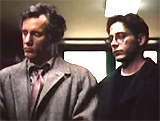 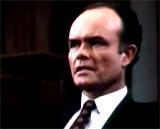
|